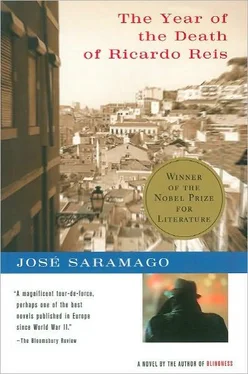José Saramago - Year of the Death of Ricardo Reis
Здесь есть возможность читать онлайн «José Saramago - Year of the Death of Ricardo Reis» весь текст электронной книги совершенно бесплатно (целиком полную версию без сокращений). В некоторых случаях можно слушать аудио, скачать через торрент в формате fb2 и присутствует краткое содержание. Год выпуска: 1992, ISBN: 1992, Издательство: Houghton Mifflin Harcourt, Жанр: Современная проза, на английском языке. Описание произведения, (предисловие) а так же отзывы посетителей доступны на портале библиотеки ЛибКат.
- Название:Year of the Death of Ricardo Reis
- Автор:
- Издательство:Houghton Mifflin Harcourt
- Жанр:
- Год:1992
- ISBN:9780547546926
- Рейтинг книги:4 / 5. Голосов: 1
-
Избранное:Добавить в избранное
- Отзывы:
-
Ваша оценка:
- 80
- 1
- 2
- 3
- 4
- 5
Year of the Death of Ricardo Reis: краткое содержание, описание и аннотация
Предлагаем к чтению аннотацию, описание, краткое содержание или предисловие (зависит от того, что написал сам автор книги «Year of the Death of Ricardo Reis»). Если вы не нашли необходимую информацию о книге — напишите в комментариях, мы постараемся отыскать её.
Year of the Death of Ricardo Reis — читать онлайн бесплатно полную книгу (весь текст) целиком
Ниже представлен текст книги, разбитый по страницам. Система сохранения места последней прочитанной страницы, позволяет с удобством читать онлайн бесплатно книгу «Year of the Death of Ricardo Reis», без необходимости каждый раз заново искать на чём Вы остановились. Поставьте закладку, и сможете в любой момент перейти на страницу, на которой закончили чтение.
Интервал:
Закладка:
He left the window open and went to open another. In his shirt sleeves, refreshed, his vigor suddenly restored, he began to unpack his suitcases. Within half an hour he had emptied them and transferred his clothes to the chest of drawers, his shoes to the shoe rack, his suits to the hangers in the closet, his black suitcase with the medical instruments to a dark recess of a cupboard. The few books he had brought with him were placed on a shelf, some Latin classics which he had got out of the habit of reading, some well-thumbed editions of his favorite English poets, three or four Brazilian authors, less than a dozen Portuguese authors. Among them he found one from the library of the Highland Brigade , a book he had forgotten to return. If the Irish librarian notices the book is missing, grave and grievous accusations will be made against the Lusitanian nation, a land of slaves and brigands, as Byron once quipped, and O'Brien will concur. Insignificant local transgressions often give rise to resounding and universal consequences. But I am innocent, I swear it was merely forgetfulness on my part and nothing more. He placed the book on his bedside table, intending to finish it one of these days, The God of the Labyrinth by Herbert Quain, also Irish, by no unusual coincidence. But the name itself is certainly most unusual, for without any great variation in the pronunciation one might read Quain as the Portuguese for Who. Take note, Quain, Quem, a writer who is no longer unknown because someone discovered him on the Highland Brigade. And if that was the only copy, and even it is now missing, all the more reason for asking ourselves Who. The tedium of the voyage and the book's evocative title had attracted him. A labyrinth with a god, what god might that be, which labyrinth, what labyrinthine god. In the end it turned out to be a simple detective story, an ordinary tale of death and investigation, the murderer, the victim, and finally the detective, all three accomplices to the crime. In my honest opinion, the reader of a mystery is the only real survivor of the story he is reading, unless it is as the one real survivor that every reader reads every story.
There are also documents to be stored away, handwritten sheets of verse, the oldest of them dated the twelfth of June, nineteen fourteen. War was about to break out, the Great War, as they were later to call it, until they experienced one even greater. Maestro, placid are the hours we lose, if in losing them, as in a vase, we place flowers. And then it finished, Tranquil, we depart this life, feeling no remorse at having lived. The most recent sheet of all is dated the thirteenth of November, nineteen thirty-five, six weeks have passed since he wrote it. Still fresh, the lines read, Innumerable people live within us. If I think and feel, I know not who is thinking and feeling, I am only the place where there is thinking and feeling, and, though they do not end here, it is as if everything ends, for beyond thinking and feeling there is nothing. If I am this, muses Ricardo Reis as he stops reading, who will be thinking at this moment what I am thinking, or think that I am thinking in the place where I am, because of thinking. Who will be feeling what I am feeling, or feel that I am feeling in the place where I am, because of feeling. Who is using me in order to think and feel, and among the innumerable people who live within me, who I am, Who, Quem, Quain, what thoughts and feelings are the ones I do not share because they are mine alone. Who am I that others are not nor have been nor will come to be. He gathered together the sheets of paper and put them into a drawer of the little writing desk, closed the windows, and went to run the hot water for a bath. It was after seven.
As the last stroke of eight echoed on the pendulum clock that adorned the wall above the reception desk, Ricardo Reis descended punctually to the dining room. The manager, Salvador, smiled, raising his mustache above his teeth, which looked none too clean, as he hurried forward to open the double doors. Their glass panels, engraved with the initials H and B, the B entwined with curves and countercurves, with appendages and floral elongations, stylized acanthuses, palm fronds, and spiraling foliage, bestowed dignity on this otherwise modest hotel. The maître d' led the way. There were no other guests in the dining room, only two waiters who had finished setting the tables. Noises could be heard coming from behind the pantry door, which bore the same monogram. From that door soup tureens, covered dishes, and platters would soon make their entrance. The furnishings were what you might expect, anyone who has seen one of these dining rooms has seen them all, a few dim lights on the ceilings and walls, immaculate white cloths on the tables, the pride of the establishment, freshened up with bleach in the laundry, if not in the Caneças, which only uses soap and sunshine, but with so much rain for days on end, it must be well behind with its work. Ricardo Reis is now seated. The maître d' tells him what is on the menu, soup, fish, meat, unless the doctor prefers something lighter, that is, another kind of meat, fish, soup. I should advise the latter until you get used to your new diet, since you have just come back from the tropics after an absence of sixteen years. So even in the dining room and kitchen they know all about him. The door leading from the reception desk was pushed open in the meantime and a couple entered with two young children, a boy and a girl, both of them the color of wax though their parents were florid, but both legitimate, to judge from appearances, the head of the family in front, guiding his tribe, the mother pushing her children forward from behind. Then a man appeared, fat and heavy, with a gold chain crossing his stomach from one little waistcoat pocket to another, and almost immediately after him came another man, very thin, with a black tie and a mourning band on his arm. No one else arrived for the next quarter of an hour. The noise of cutlery could be heard against the plates. The father of the children, authoritative, struck the knife against his wineglass to summon the waiter. The thin man, his mourning disturbed and good breeding offended, gave him a severe look, but the fat man calmly went on chewing. Ricardo Reis contemplated the blobs of grease that floated on his chicken broth. He had chosen the lighter meal, following the maître d's suggestion out of indifference rather than conviction, for he could see no real advantage to it. A ruffling sound against the windowpanes told him that it had started raining again. These windows do not face onto the Rua do Alecrim, what street could it be, he cannot remember, if he ever knew, but the waiter who comes to change his plate informs him, This is the Rua Nova do Carvalho, Doctor, before asking, Did you enjoy your soup. From the waiter's pronunciation, which is good, one can tell that he is Galician.
Through the door now entered a middle-aged man, tall and distinguished in appearance, with a long, lined face, along with a girl in her twenties, if that, and thin, although it would be more correct to describe her as slender. They made their way to the table facing Ricardo Reis and it suddenly became clear that the table had been awaiting them, just as an object awaits the hand that frequently reaches out and takes possession. They must be regular clients, perhaps the owners of the hotel. It is interesting how we forget that hotels have an owner. These two, whether the owners or not, crossed the room at their leisure as if in their own home. Such details you notice when you pay attention. The girl sat in profile, the man with his back to Ricardo Reis, and they conversed in a whisper, but she raised her voice as she reassured him, No, Father, I'm fine. So they are father and daughter, an unusual pairing in any hotel nowadays. The waiter came to serve them, solemn but friendly in his manner, then went away. The room was silent again, not even the children raised their voices. How strange that Ricardo Reis cannot remember having heard the children speak, perhaps they are mute or have their lips stapled together with invisible clips, an absurd thought, since they are both eating. The slender girl, finishing her soup, puts down the spoon, and her right hand starts to caress her left hand as if it were a little lapdog resting on her knees. Surprised by this, Ricardo Reis realizes that her left hand has never moved, he remembers that she used only her right hand to fold her napkin, and now she is holding the left and is about to rest it on the table, very gently, like the most fragile crystal. There she leaves it, beside her plate, a silent presence at the meal, the long fingers extended, pale, inert. Ricardo Reis feels a shiver, no one is feeling it for him, his skin shivers within and without, as in utter fascination he watches that hand, paralyzed and insensible, ignorant of where it should go unless taken, resting to catch the sun or listen to the conversation or be seen by the doctor who has just arrived from Brazil. A tiny hand which is left on two counts, left because it is lying on the left side and left because it is a gauche, disabled, lifeless, and withered thing that will never knock on any door. Ricardo Reis observes that the plates for the girl come from the pantry already prepared, the fishbones removed, the meat diced, the fruit peeled and cut into segments. It is clear that the daughter and father are well known to the hotel staff, they may even live in the hotel. He finished his meal but lingered a while, to allow time, but what time and for what. At last he got up, drew back his chair, and the noise he made, too loud perhaps, caused the girl to turn around. Seen from the front, she looks older than twenty, but in profile her youth is immediately restored, her neck long and fragile, her chin finely molded, the entire restless line of her body insecure, unfinished. Ricardo Reis got up from the table, headed for the glass-paneled door with the monograms, where he was obliged to exchange courtesies with the fat man who was also leaving. After you, sir, Please, after you. The fat man went out, Thank you, kind sir, a somewhat obsequious use of the word sir, for if we are to take all words literally, Ricardo Reis would have passed first, for he is innumerable men, according to his own understanding of himself.
Читать дальшеИнтервал:
Закладка:
Похожие книги на «Year of the Death of Ricardo Reis»
Представляем Вашему вниманию похожие книги на «Year of the Death of Ricardo Reis» списком для выбора. Мы отобрали схожую по названию и смыслу литературу в надежде предоставить читателям больше вариантов отыскать новые, интересные, ещё непрочитанные произведения.
Обсуждение, отзывы о книге «Year of the Death of Ricardo Reis» и просто собственные мнения читателей. Оставьте ваши комментарии, напишите, что Вы думаете о произведении, его смысле или главных героях. Укажите что конкретно понравилось, а что нет, и почему Вы так считаете.












